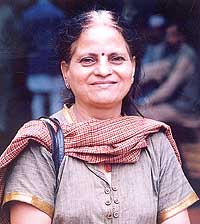 There is something determinedly Keatsian about Shashi Kala Tiwari, the eminent poet and artist. She is forever in search of beauty and harmony. "I never paint anything gloomy, there is enough sadness in this world," she says with a playful smile in her voice. Her paintings burst with colours and strong brush strokes to create an abstract glow of nature's radiance.
There is something determinedly Keatsian about Shashi Kala Tiwari, the eminent poet and artist. She is forever in search of beauty and harmony. "I never paint anything gloomy, there is enough sadness in this world," she says with a playful smile in her voice. Her paintings burst with colours and strong brush strokes to create an abstract glow of nature's radiance. In her art, flowers symbolise the beauty and benevolence of the human spirit. This appreciation came at a price. She recounts an incident that took place on a freezing winter morning a few years ago when she slipped and fractured her leg on the way to Bungamati. As she lay there, helpless and in pain, no one came to her aid. Even the pilgrims on their way to Karya Binayak ignored her. Shocked by their indifference, Shashi blamed the city's corrosive influence. ("The eye of the city is poisonous." she wrote in her poem The Aborigines and the Jungle.) After more than an hour, an old farmer helped her up and half carried her to a taxi so she could get some medical attention. Although Shashi was traumatised by the whole event, she says that stranger's kindness restored her faith in people. She never met him again.
 The other man who influenced Shashi was her father: he always encouraged her to pursue art. Today, the 53-year-old is regarded as one of Nepal's best painters. She has held several solo international exhibitions in Japan, Korea, India, Germany, Bangladesh, South Korea and the UK. The Nepal Association of Arts has twice named her the best national artist (1981, 1984) and she recently received the prestigious Gorkha Dakshin Bahu.
The other man who influenced Shashi was her father: he always encouraged her to pursue art. Today, the 53-year-old is regarded as one of Nepal's best painters. She has held several solo international exhibitions in Japan, Korea, India, Germany, Bangladesh, South Korea and the UK. The Nepal Association of Arts has twice named her the best national artist (1981, 1984) and she recently received the prestigious Gorkha Dakshin Bahu. As a struggling artist, Shashi often sold her poems for Rs 30 each to pay for art supplies. Of course, things are different now: "I don't write for money anymore, but for art and literature," she says. Her favourites include Shradhanjali (a tribute to the Late King Birendra and the royal family), Bichalit Bartaman (dedicated to the victims of Kalikot incident) and Timi Afno Pachi Koon Dhuni (on the crisis in the country). Shashi cannot imagine what she would do if she wasn't an artist. "Painting and poetry keep me alive," she says. (Naresh Newar)


